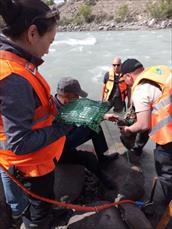
Installation of passive samplers in the river basin (May–June 2023).
The objectives of this ICI cooperation are improvement for carrying out national surface water quality monitoring program and development of capacities for water quality pollution studies. This will include capacity building of water laboratories, preparing for efficient field working, investing in data management and digitalization and carrying on cooperation with local stakeholders and international community on water and environmental issues (e.g., UNECE, UNDP, OECD, EEAS).
Development activities focus on analytical instruments and their use, including methods of systematic quality assurance and quality control (QA/QC). This all having a purpose to provide information services within govt decision making for water protection and for safe water for users. Capacities to report trustworthy on water quality within many national and international agreements and multilateral connections is a priority, too.
This ICI collaboration aims to enhance the capacities of the responsible Kyrgyz authority - Ministry of Natural Resources, Ecology and Technical Supervision (MNRETS) - in its efforts to enhance Kyrgyzstan’s progress in the SDG target 6.3 (improve water quality, wastewater, and safe reuse), and the target 6.3.2 (proportion of bodies of water with good ambient water quality) in particular.
The project will focus on enhancing information basis, information management, and use of information, which together form the basis for effective integrated water resources management, this being one of the aims of Kyrgyz govt. Regular monitoring of carefully selected water quality parameters, access to reliable and well managed data, and frequent assessments of the status of waters in major water bodies are all important services that the mandated governmental entity MNRETS should be able to provide both at national and sub-national levels (in oblasts and river basins) to various stakeholders and the people.
In the long term, the increased ability of the environmental administration to define an acceptable status and to set specific objectives for the water quality in various water bodies will improve enforcement of the environmental law: i.e., assessment of pollution and climate change impacts on waters, enforcement of environmental permits etc.
In rural areas, the links between deteriorating water quality, livelihoods and health are direct, as a considerable share of the poorest population still use surface waters as their main source for household use and animal husbandry. Deterioration of water quality may pose serious threats to their health and livelihoods. Thus, the authorities’ (duty bearers’) ability to perform their tasks and provide service is also linked to one of the basic human rights: ‘access to safe water’.
In the long run, the project is expected to have an impact on the capacities of Kyrgyz authorities to apply regular monitoring, reliable data, and assessments on quality of surface waters as basis for promoting Integrated Water Resources Management (IWRM).
Further information
KGZ-Water III project webpage

Logo of the project KGZ Water III